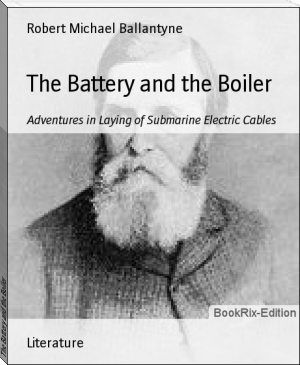The Battery and the Boiler: Adventures in Laying of Submarine Electric Cables by - (best large ereader txt) 📗

- Author: -
Book online «The Battery and the Boiler: Adventures in Laying of Submarine Electric Cables by - (best large ereader txt) 📗». Author -
“Ay, ay, lad—I know—difference of longitude,—fire away.”
“Well, I have fired away most of my ammunition now,” returned Sam, “and if you don’t haul down your colours, it must be because you have nailed them to the mast and are blind to reason. I may add, however, that the Viceroy of India sent a telegram to the President of the United States, to which he got a reply in seven hours and forty minutes, but the slowness of this message was accounted for by the fact of accidental and partly unavoidable delay in transmission both in Washington and London. At 1:30 a.m. of the 24th the traffic of the line became pressing, and all complimentary messages ceased with one from Bombay, which said, ‘Sun just risen; delightfully cool; raining.’”
“Doesn’t it seem as if the Baron Monkhausen’s tales were possible after all?” remarked Mrs Wright, looking as if her mind had got slightly confused.
“The Baron’s tales are mere child’s-play, mother,” said Robin, “to the grand facts of electricity.”
“That’s so, Robin,” said Sam, still turning over the leaves of his note-book, “and we had some magnificent experiments or illustrations at the fête, which go far to prove the truth of your remark—experiments which were so beautiful that they would have made the eyes of Letta sparkle even more gorgeously than they are doing at present, if she had seen them.”
Letta blushed, returned to self-consciousness for a moment, looked down, laughed, looked up as Sam proceeded, and soon again forgot herself in a fixed and earnest gaze.
“The two telegraph instruments communicating with India and America, which stood on two tables, side by side, in Mr Pender’s house, were supplied by two batteries in the basement of the building. Eighty cells of Daniel’s battery were used upon the Penzance circuit for India, and 100 cells on the Brest circuit for America. The ordinary water-pipes of the house served to connect the batteries with the earth, so as to enable them to pump their electricity from that inexhaustible reservoir.”
“I was not aware that electricity had to be pumped up through pipes like water,” interrupted Mrs Wright, on whose mild countenance a complication of puzzled expressions was gradually gathering.
“It is not so pumped up,” said Sam. “The pipes were used, not because they were pipes, but because they were metal, and therefore good conductors.”
“But you haven’t told us about the beautiful experiments yet,” murmured Letta, a little impatiently.
“I’m coming to them, little one,” said Sam. “One battery exhibited the power as well as the beauty of that mysterious force which we call electricity. It was the large Grove battery. A current passed from it to copper wires, in a certain manner, produced a dazzling green light, and the copper melted like wax. With silver a still brighter and purer green flame was the result. With platinum an intense white light was given off, and the molten metal fell in globules of exceeding brilliancy. With iron lovely coruscations were exhibited, the boiling vapour flying and burning in all directions; and a platinum wire three feet long was in an instant melted into thousands of minute globules. All this showed the power of electricity to produce intense heat when resistance is opposed to its passage.”
“It is remarkably human-like in that respect,” said Captain Rik, in an under-tone.
“Then its power to produce magnetism,” continued Sam, “was shown by Lord Lindsay’s huge electro-magnet. This magnet, you must know, is nothing but a bit of ordinary metal until it is electrified, when it becomes a most powerful magnet. But the instant the current is cut off from it, it ceases to be a magnet. If you understood much about electricity,” said Sam, looking round on his rapt audience, “I might tell you that it is upon this power of making a piece of iron a magnet or not at pleasure, that depend the Morse and Digné telegraph instruments; but as you don’t understand, I won’t perplex you further. Well, when a piece of sheet copper was passed between the poles of Lord Lindsay’s giant magnet, it was as difficult to move as if it had been sticking in cheese—though it was in reality touching nothing!—influenced only by attraction.” (“That beats your power over Sam, Madge,” whispered Robin. “No it doesn’t,” whispered Madge in reply.) “Then, one most beautiful experiment I could not hope to get you to understand, but its result was, that a ten-gallon glass jar, coated inside and out with perforated squares of tinfoil, was filled with tens of thousands of brilliant sparks, which produced so much noise as completely to drown the voices of those who described the experiment. A knowledge of these and other deep things, and of the laws that govern them, has enabled Sir William Thomson and Mr Cromwell F. Varley to expedite the transmission of messages through very long submarine cables in an enormous degree. Then the aurora borealis was illustrated by a large long exhausted tube—”
“I say, Sam,” interrupted Rik, “don’t you think there’s just a possibility of our becoming a large long-exhausted company if you don’t bring this interesting lecture to a close?”
“Shame! shame! uncle Rik,” cried Robin.
As the rest of the company sided with him, the captain had to give way, and Sam went on.
“I won’t try your patience much longer; in fact I have nearly come to an end. In this long exhausted tube, ten feet in length and three inches in diameter, a brilliant and beautiful crimson stream was produced, by means of an induction coil. In short, the occasion and the proceedings altogether made it the most interesting evening I have ever spent in my life, e–except—”
Sam paused abruptly, and looked at Madge. Madge blushed and looked down under the table,—presumably for the cat,—and the rest of the company burst into an uproarious fit of laughter, in which condition we will leave them and convey the reader to a very different though not less interesting scene.
In a small wayside cottage in the outskirts of one of those picturesque villages which surround London, an old woman sat at the head of a small deal table, with a black teapot, a brown sugar-basin, a yellow milk jug, and a cracked tea-cup before her.
At the foot of the same table sat a young man, with a large knife in one hand, a huge loaf of bread in the other, and a mass of yellow butter in a blue plate in front of him.
The young man was James Slagg; the old woman was his mother. Jim had no brothers or sisters, and his father chanced to be absent at market, so he had the “old lady” all to himself.
“Well, well, Jim,” said Mrs Slagg, with a loving look at her son’s flushed face, “you’ve told me a heap o’ wonderful tales about telegrumphs, an’ tigers, an’ electricity an’ what not. If you was as great a liar as you was used to be, Jim, I tell ’ee plain, lad, I wouldn’t believe one word on it. But you’re a better boy than you was, Jim, an’ I do believe you—indeed I do, though I must confess that some on it is hard to swallow.”
“Thank ’ee, mother,” said Jim, with a pleasant nod, as he cut an enormous slice from the loaf, trowelled upon it a mass of the yellow butter, and pushed in his cup for more tea.
“It was good of ye, Jim,” said the old woman, “to leave all yer fine friends and come straight away here to see your mother.”
“Good o’ me!” ejaculated Jim, with his mouth full—too full, we might say—“what goodness is there in a feller goin’ home, eh? Who’s finer, I should like to know, than a feller’s mother?”
“Well, you are a good boy, Jim,” said the old woman, glancing at a superannuated clock, which told of the moments in loud, almost absurd solemnity; “but if you don’t stop talkin’ and go on wi’ your eatin’, you’ll lose the train.”
“True, mother. Time and tide, they say, wait for no man; but trains is wuss than time or tide, they won’t even wait for a woman.”
“But why go at all to-day, Jim; won’t to-morrow do?”
“No, mother, it won’t do. I didn’t mean to tell ’ee till I came back, for fear it should be a mistake; but I can’t keep nothin’ from you, old lady, so I may as well ease my mind before I go. The fact is, I’ve just heard of the whereabouts of John Shanks—Stumps, you know—my old mate, that I’ve told you bolted with all our treasure from Bombay. Ah! mother, if I’d only brought that treasure home wi’ me, it’s a lady you’d have bin to-day. I had all sorts o’ plans for you—a coach an’ six was—”
“Never mind your plans, Jim, but tell me about poor Stumps.”
“Well, mother, a tramp came past here, an’ had a bit of a talk wi’ me yesterday. You know I ginerally have a bit of a chat wi’ tramps now, ever since that city missionary—God bless him—pulled me up at the docks, an’ began talkin’ to me about my soul. Well, that tramp came here early this mornin’, sayin’ he’d bin in a poor woman’s house in the city, where there was a man dyin’ in a corner. While he was talkin’ with some o’ the people there he chanced to mention my name, an’ observed that the dyin’ man got excited when he heard it, and called to the tramp and asked him about me, and then begged him, for love and for money, which he offered him, to come and fetch me to him as fast as he could, sayin’ that his name was Stumps, and he knew me. So, you see, as the next train is the first that—you needn’t look at the clock so often, old lady; it’s full ten minutes yet, and I’ll back my legs to do it in three.”
“Don’t forget to take your Bible wi’ you, dear boy.”
Jim Slagg rose with a pleasant nod, slapped the breast of his coat, on which the oblong form of a small book in the pocket could be traced, said “Good-day, mother,” and left the cottage.
It was not long before he stood in the dark passage which led to the room described to him by the tramp. The old woman who rented it gave him her unasked opinion of her lodger before admitting him.
“You’ve got no notion, sir, what a strange character that young man is.”
“O yes, I have; let me see him,” said Slagg.
“But, sir,” continued the landlady, detaining him, “you must be careful, for he ain’t hisself quite. Not that he’s ever done anythink wiolent to me, poor young man, but he’s strong in his fits, an’ he raves terribly.”
“Has no doctor bin to see him?” asked Slagg.
“No; he won’t let me send for one. He says it’s o’ no use, an’ he couldn’t afford to pay for one. An’ oh! you’ve no notion what a miser that poor young man is. He must have plenty of money, for the box as he takes it out on—an’ it’s at his head he keeps it, day and night, ginerally holdin’ it with one hand—seems full





Comments (0)